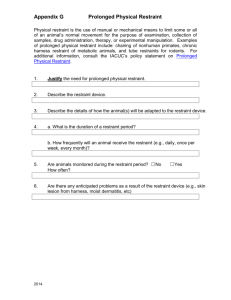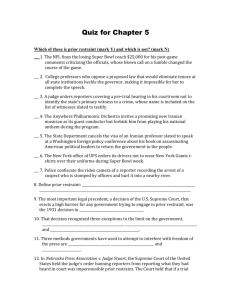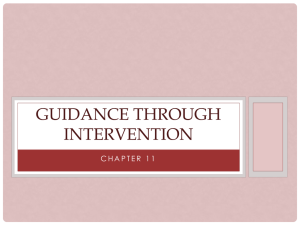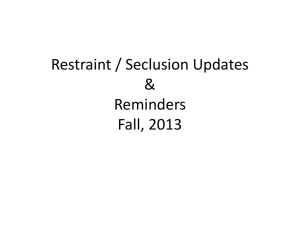Therapeutic Crisis Intervention
advertisement
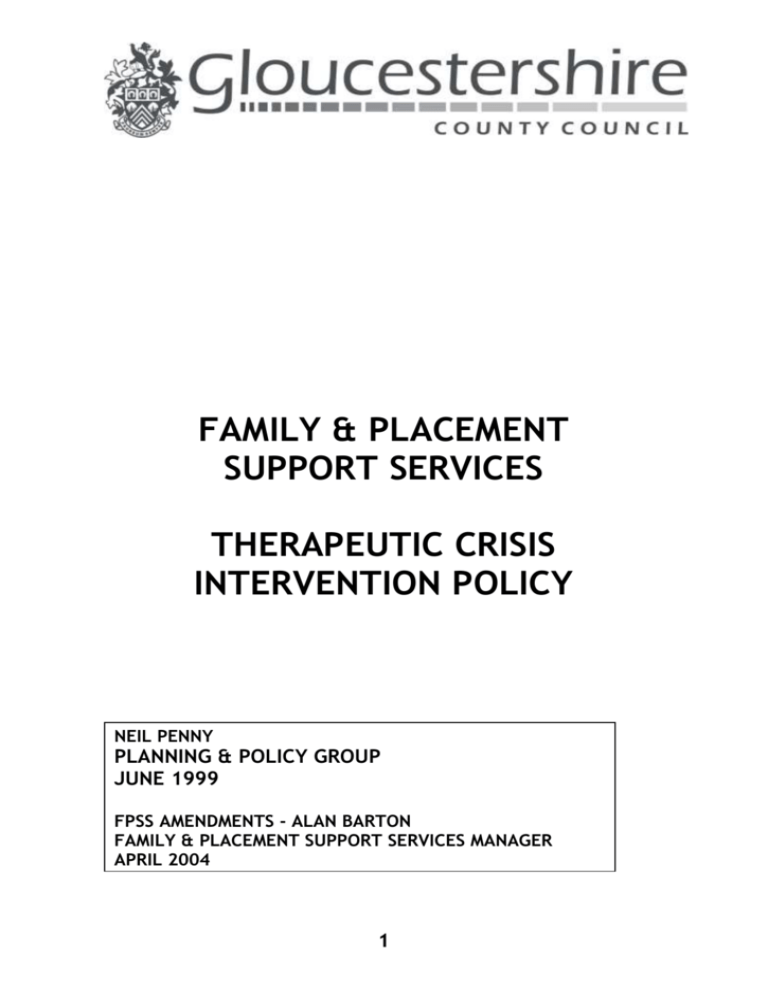
FAMILY & PLACEMENT SUPPORT SERVICES THERAPEUTIC CRISIS INTERVENTION POLICY NEIL PENNY PLANNING & POLICY GROUP JUNE 1999 FPSS AMENDMENTS - ALAN BARTON FAMILY & PLACEMENT SUPPORT SERVICES MANAGER APRIL 2004 1 FAMILY & PLACEMENT SUPPORT SERVICES (FPSS) THERAPEUTIC CRISIS INTERVENTION CONTENTS 1. Policy Statement PAGE 3 2. Purpose 3 3. Scope 3 4. Definitions 3 5. Context of Policy 3 6. Mandatory Procedures 3 7. Practice Guidance 4 8. Monitoring 5 Appendix 1 6 2 FAMILY & PLACEMENT SUPPORT SERVICES (FPSS) THERAPEUTIC CRISIS INTERVENTION 1. Policy Statement The Family and Placement Support Service use Therapeutic Crisis Intervention (TCI see Appendix 1) in its emergency overnight accommodation and in the Activities Team. It is essential for the department to establish consistency in its techniques for dealing with potential and actual crises within its teams. 2. Purpose All aspects of TCI will be given to staff through formal training with emphasis placed on preventing the use of restraint by managing a given situation. There is also a need to formalise the recording of the circumstances in which a situation occurs and the actions taken to deal with it. This will enable the department to analyse cases where crisis intervention was necessary and support staff more fully where trends are identified. Untrained staff do not use the physical elements of TCI. 3. Scope The policy will apply to all staff who are involved in looking after children at Social Services residential units and within the Activities Team. There are direct links to the existing policy on Restraint and will also be links to the policy on Recording Significant Events. 4. Definitions Therapeutic Crisis Intervention - This process was developed by Cornell University in the USA " To provide positive, therapeutic, practical and proven methods for managing children in crisis." A more detailed description of the key elements of TCI is given in Appendix 1. 5. Context of the policy 5.1 The policy is framed under the Children Act 1989. 5.2 The Children Act 1989 Guidance and Regulations - Volume 4: Residential Care deals with issues around disciplinary measures. 6. Mandatory Procedures 6.1 TCI is the method that the Family and Placement Support Service use to deal with crisis situations. To this end the methods of restraint taught as part of the TCI training course are the ones that should be used within residential units or the Activities Team. 3 7. Practice guidance There are a number of different approaches that can be adopted to resolve a particular crisis situation and these can be adapted to what suits the personalities of the worker and young person involved. These will be explored through the training. 7.1 Early Intervention 7.1.1 The emphasis in TCI is placed on early identification of potential for crisis and acting to defuse the situation. By identifying that a situation is developing in a way that could lead to violence, techniques can be used to reduce the tension and avoid the need for restraint. 7.2 Restraint 7.2.1 Physical restraint is not an easy option and places a considerable strain, both mental and physical, on all those involved. It is however, at times unavoidable and necessary to prevent a young person harming themselves, others or property. Full details of the restraint techniques are given in the training programme. Key points to remember are: 7.2.2 Before deciding to restrain a person singly, a member of staff should gauge their own level of control and also the comparison in size between them and the young person to be restrained. 7.2.3 The restraint techniques dealt with during the training course are the only ones which should be used with young people within a unit setting or in a public place. 7.2.4 It is essential in the initial stages of restraint that staff do not talk to the young person. This has been shown to be an effective way to defuse a situation and helps those involved to regain emotional control. 7.2.5 All incidents of restraint must be recorded with reports being acknowledged and signed by the team manager. Copy of the report must by placed on the young person’s file. 7.3 Recovery 7.3.1 An important element of TCI is the recovery period following a restraint taking place. The key guidelines are: 7.3.2 The opportunity should be taken to discuss with the young person what led to the crisis situation and what other ways could be used to deal with a similar situation in a way which would not lead to confrontation. 4 7.3.3 The life space interview which takes place, either singly or in a group situation, should ideally be conducted by the member of staff principally involved in restraining the young person. 7.3.4 Following the life space interview it is important to establish a plan which will address the circumstances which led to the restraint occurring. Involvement of the young person restrained is essential at all stages of the recovery period in order that future plans can be agreed by all sides. 7.3.5 As soon as possible after a restraint, discussion should take place between the staff involved and a senior practitioner or team manager not directly involved in the restraint. This should include the situation leading to the restraint, the restraint itself and the measures that have been put in place to try and avoid any repetition. 8. Monitoring Incidents involving restraint will be monitored through the supervision process. Linked to this will be specific feedback about the use of TCI from all those involved, to enable the Family and Placement Support Service to evaluate the impact of this approach at its various stages, not just with regard to the use of restraint. 5 Appendix 1 Therapeutic Crisis Intervention Background TCI is concerned with managing situations using positive actions and procedures to avoid a situation being reached where restraint is necessary. Where it does become necessary to restrain there are techniques suggested, as presented in training sessions to staff by the Family and Placement Support Service authorised trainers, Alan Barton, Alayne O'Connor and John Cotton. Key elements of Therapeutic Crisis Intervention TCI aims to provide child care workers with the skills and knowledge through which the child changes old habits, destructive responses and maladaptive behaviours patterns. The goal of the training programme is to train child care workers to develop new responses to their environment that will enable them to achieve a higher level of social and emotional maturity. TCI will help staff to develop skills, knowledge and attitudes that enable them to deal with children when they are at their most destructive. TCI will provide staff with an appreciation of the influence adults have as those responsible for the care and treatment of damaged children in crisis situations. TCI will emphasise the need for staff to respond to the feelings behind the displays of aggression and violence by young people as well as the behaviour itself. TCI training consists of five modules: 1. Crisis as Opportunity 2. Awareness 3. Early Interventions 4. Therapeutic Physical Interventions 5. Recovery 6
